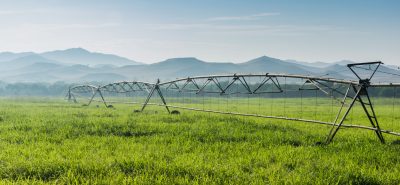
We’ve reached the halfway point of the program — and with that, we’d like to spotlight another one of our ten startups. Opti-moo is an agri-tech startup leveraging cutting-edge technology to optimize irrigation practices.
CCEI’s Kate Savinelli was able to sit down with Alaa Selim and Intisar Rouabhia, co-founders of Opti-moo.
—
Tell me initially how you came up with your startup idea. What spurred it?
It’s started in COVID, through a network called the Mediterranean Youth for Water Network. We were invited to a hack-a-thon, and at that time there were no physical events, so it was virtual. They gave our team about one day to come up with an idea that addresses the water energy nexus. I remember that we didn’t sleep during that time; we were just talking about something that could help farmers and solve the water energy nexus as a whole. Then, we came up with the idea of developing a device that can help farmers watch their crops and tend to them in the best way.
We won first place, which inspired us to turn our hack-a-thon idea into a startup.
How would you describe Opti-moo?
Opti-moo is an agri-tech precision irrigation solution that helps small-scale farmers better manage and optimize their water resources. This results in obtaining better crops both in quantities and qualities.
What specifically does that entail? Is it a product, a device, a system?
It’s all of them! So it’s software, hardware, and consultancy.
First, it’s a device. If [farmers] have a pump system, or a pipe via a plumbing system, [we would] add a water sensor that will collect data through our controller. The hardware controller will stay onsite at the farm, so that in real-time it will send data to an application. The application will tell you about the optimal rate of water flow, and advise you to either switch it off or on according to the crop data you entered as a user. We also have consultancy in case users are struggling with the software or hardware solution, led by a group of engineers.
It’s important to note, though, that we’re not a smart meter — we are an optimal device that helps farmers have optimal rates and understand their agriculture.
In terms of target customer: is it farmers, or is it a wider net?
For now, it’s small, local farmers. After pitching many times, we got feedback from investors to specify a smaller target customer. But, it could also be for someone who owns a soccer field. Or a university, for example, that has a lot of green space to irrigate. We’re working to include other segments like gardeners, fields, and playgrounds.
Have you faced any obstacles in your journey? Anything you’ve had to pivot from?
So far, because we started in a different context in the Middle East, the need for our device was due to a resource shortage. But here, as we changed geographical contexts, we needed to make some adjustments in the way we communicate our solution to a farmer.
Here, we may or may not have a resource problem, a water resource problem, or an availability problem. So, we’re trying to find a way to better fit our solution within the local context of Connecticut. Here, we’d like a farmer to be able to save more time in the field, and maybe have more time to take care of other tasks besides irrigation.
Another challenge we have is proving the actual idea. For example, we have many competitors. Obviously, they also leverage their model of a smart-meter to now have more data analytics. This can be a tough competitor for us.
That’s why we are trying to refine our model and working more in the optimization area — how to give farmers optimization and teach them about the value of our product.
I feel like there are a lot of competitors out there. So, I can see how distinguishing yourself will be a challenge.
There are many solutions and many competitors, but the problem is still not solved. Irrigation still consumes a lot of water. And globally, 70% of water goes to irrigation. So, there’s something not working, and there’s always a need for technology to optimize resources.
That’s why we are sure there is a great market fit for us, and that’s what keeps us going.
What other accelerator programs, if any, have you been a part of?
First, it started with the hack-a-thon we won first place in. Luckily, we got incubated by a large incubator in the Middle East and Lebanon for about two years.
We were able to have the device ready to test in Egypt, and even have customers give us feedback. We had a lot of mentorship on how to mediate the market, and got some strategic partnerships in Egypt.
We’ve been a part of CEWAS, MedYWat, and Halcyon House’s MENA program.
Then, we came to the United States — and CCEI has helped us a lot. It first started with CCEI’s Get Seeded pitch nights, which we won second place in. Then we did a lot of customer discovery through CCEI’s Accelerate UConn phases 0, 1, and 2.
For entrepreneurs and people working in startups, you should really have a belief in your idea, because there are many opportunities available to you to get your idea to market.
We tried Opti-moo out in two different locations and models, and had the same support in both areas of the world. In the Middle East and Egypt, we participated in a lot of incubators with people supporting us, interviewing us, and helping us financially. In the U.S., we had that same impression and experience.
If you have a belief in your idea and you want to see it to completion, you will have many organizations and people to help you do that.

Do you have any significant goals you’ve hit, or progress you look back on?
Our testing phase was great.
My background was originally in research and electrical engineering. So, my routine was working for an organization, having a customer, and having a solution for them. But, it didn’t come to mind that someday I would build my own device and try to get my own customers.
It is a totally different space, and it’s very hard to prove our product. Now, I need to find a customer and explain the device and solution to them.
Just one month before I traveled to the U.S., I had a meeting at a farm called Al Sorat — our pilot farm. The farmer invited us to visit and see what was happening. When I went, she introduced me to the farmers on her team. When I plugged my device in, they liked it and got basic training on how to use it. I told them:
“I’m going to leave in one month, but I’ll follow up with you to see what’s going on, and if it really helps you out.”
Luckily, they reached out to me after one or two months and said they were really excited about what the device had done. They were so happy. It was the best feeling — and it made me so happy to know that the farmers had now learned something new and had more knowledge on irrigation.
This pilot farm triggered us to realize that the device and model could cause success for many other farmers. The owner of Al Sorat introduced us to other farms in the area, and they were also excited about the product. The best feeling is having the product that’s delivered to your customer be successfully deployed.
We recently talked to Wayne Bragg in Summer Fellowship’s office hours, and he gave us a good plan to start our testing phase here in Connecticut, so we’re looking forward to the next few months. Even in our testing phase, I am sure our device won’t work perfectly, but we’re looking forward to the feedback we will receive and how we will improve our overall solution.
How many team members do you have now?
We technically have four co-founders. Alaa is working as a Technical Lead to invent the technology and develop it. Intisar is working in the agronomy sector to make sure our model can be applied, and to make sure we have a good model. We also have two co-founders based out of Italy who are working on business development.
We have recruited engineers along the way to help us as well in development and packaging.
We would love to have interns on our team to get them involved in different areas like business, analytics, engineering, agronomy, and more. And definitely finances!
There’s definitely a lot of startups that end up needing a CFO, because that in itself is a difficult part of entrepreneurship.
Yes! We are learning the importance of that through Summer Fellowship. It’s really, really important, and we’re trying to work hard on the financial side of things in the next few months.
If somebody would like to learn more about Opti-moo, who should they get in contact with?
You can reach out to either of us for any further information or clarifications. We are developing the website now. But our emails are alaa.selim@uconn.edu and rouabhiaintissar@gmail.com.